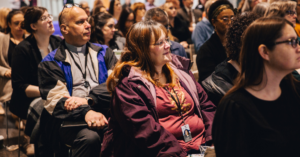
Welcome Home: Using Coordinated Care Networks to Aid Reentry and Ensure Anti-Recidivism
This post is part of our community blog series that highlights best practices and solutions from our network partners. Today’s post is contributed by Unite Us team members Casanya Ursery and Megan Eluhu.
In 2015, Daniel Silva was released from prison in Sacramento, California. He had spent the last 39 years in prison. Wrongfully charged with a crime he didn’t commit, Daniel was tried as an adult and handed a life sentence at 17. Now the CEO of Self Awareness and Recovery (SAR), a non-profit organization he founded while still incarcerated, Daniel’s path to becoming a changemaker in the Sacramento community is a story of resilience, dedication, and self-determination.
Daniel describes the first two decades of his time in prison as a time where he felt “completely lost.” A spark of change and transformation in his life came through his participation in a trauma support program, where he learned the tools and skills needed to confront and process his past traumas as a means to healing. In this program, Daniel first heard someone say, “hurt people hurt people, but healed people heal people,” a mantra that resonated with him and would later become a guiding principle for his work. After his release from prison, Daniel continued the SAR mission. He established the non-profit organization outside of prison to continue offering trauma support workshops for previously incarcerated individuals reentering society and youth in the community. SAR teaches justice-involved youth and adults how to heal from trauma and turn away from self-destructive patterns and behaviors. Since its conception, SAR workshops have spread to ten other prisons across California.
program, Daniel first heard someone say, “hurt people hurt people, but healed people heal people,” a mantra that resonated with him and would later become a guiding principle for his work. After his release from prison, Daniel continued the SAR mission. He established the non-profit organization outside of prison to continue offering trauma support workshops for previously incarcerated individuals reentering society and youth in the community. SAR teaches justice-involved youth and adults how to heal from trauma and turn away from self-destructive patterns and behaviors. Since its conception, SAR workshops have spread to ten other prisons across California.
Timely connection to wrap-around services is key to reentry success
Reentry refers to the process by which detained or incarcerated individuals return to the community upon release from state or federal prisons, jails, or parole. Once released, the longer it takes for a person to get connected to reentry services, the more likely they are to carry out repeat offending, otherwise known as recidivism.Over half of all incarcerated individuals lived in poverty before their arrest and are more likely to return to poverty or experience homelessness after their release, with little assistance provided upon release. 64% of our jail population suffers from mental illness, 68% from substance use disorders, and 44% from chronic health problems. Communities need centralized infrastructure that can coordinate care and support diversion and reentry initiatives to break these cycles.
“The Unite Us network makes it possible for SAR navigators to support adults and youth in the Sacramento community who have been or might be involved in the justice system. The network makes it possible for us to coordinate and connect those we serve with the resources they need to be successful and heal from the trauma they have experienced.”
-Daniel Silva, Self Awareness & Recovery (SAR)
Models of success
Since 1970, the U.S. prison population has risen by over 400 percent and currently one in every 35 U.S. adults are in prison, jail, on parole, or probation. The community network infrastructure created by Unite Us provides a collaborative ecosystem of health, human, and social service providers that leverages evidence-informed interventions needed for successful reentry. No longer are providers relegated to disconnected silos, attempting to be all things to each of their clients. Instead, with the Unite Us Platform, community partners can coordinate services across sectors to provide the full range of service and support. Daniel and the SAR navigators are working within a diverse network in the Sacramento community able to offer connections to multiple types of supports and services. Here are just a few examples:
- Sacramento Covered bridges the gap between systems and the community through a peer-driven, one-on-one approach to best respond to individual needs. They recently partnered with the Sacramento County Department of Public Health’s Adult Correctional Health program to help ease the transition during reentry by ensuring that medical treatment and medication continue beyond release from incarceration.
- The Anti-Recidivism Coalition (ARC) is one of the most effective rehabilitation programs in the country. ARC has a high level of success, with an approximate 11% recidivism rate. Key to their success is peer-to-peer counseling and collaboration with community partners and agencies across sectors.
- The Health Education Council (HEC) is committed to promoting health in underserved communities, including promoting health through neighborhood safety. With programs like Facilitadores Comunitarios and Sacramento Youth Violence Prevention Collective, HEC connects communities with the necessary services and support to safeguard youth and adults from lifestyles influenced by crime.
Now is the time for coordinated solutions
In recent years, we have witnessed leaders across sectors challenge the inequities in our criminal justice system and advocate for more effective methods of curbing crime and recidivism. Unite Us acknowledges our role in supporting this change by building community networks that are ready, able, and willing to provide the wraparound support justice-involved youth and adults need. Together, our community partners meet immediate social needs while tracking outcomes and engaging in community-wide discussions on data and policy. Though criminal justice reform will not come overnight, we are confident that in coming together, our collective action can make an even greater impact on health and health equity.
Watch the Forum on Criminal Justice Reform to hear more about what these organizations are doing to reform criminal justice in California:


